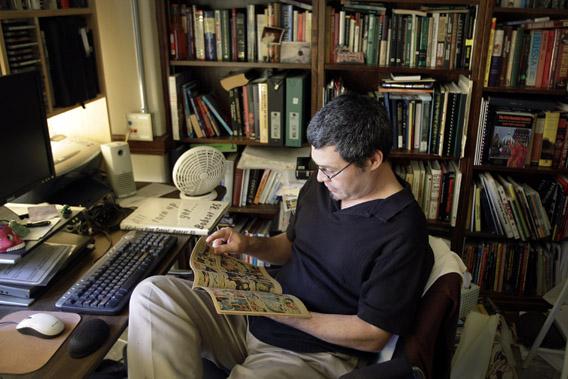One could say my Ph.D. in English and American literature has garnered me exactly nothing in terms of practical, worldly rewards. I am not the distinguished poetry professor I dreamt of being when I was 20. And yet, there hasn’t been a moment in my career when I haven’t used it, when that very particular disciplined training, the hours spent reading Milton or John Berryman’s Dream Songs while leaning against the sunny library, with blooming undergraduates flirting on the grass, hasn’t helped me.
I thought of all of this while reading Slate’s lively jeremiad against doctoral degrees. The days lost in the stacks of the library. The nights spent drinking out of plastic cups at the “Debasement Bar” in the basement of the graduate college. If I was being efficient, I could have just gone straight into journalism and writing, without the five years studying for a degree in literature, but I would have been undeniably worse at it. I often dip into things I learned in those years, a quote from Andrew Marvell, a scene from Clarissa, a heated conflict in a class on forgotten women writers, but the more intangible benefits linger as well.
One of the often mocked delusions of a doctoral program is that you begin to think your tiny little area of research is of great, earth-shattering importance. This might, on the surface, seem like a bad thing, but it’s actually a very useful state of mind to be able to get into. You walk around thinking that your tiny little topic, your remote corner of expertise, your moments of illumination and minuscule breakthroughs are huge, the beating center of the universe. (If you do not think this, you can’t finish; you can’t spend years laboring pretty much in poverty, definitely in obscurity, doggedly pursuing this one arcane thing, as your peers begin to slowly rise in power and responsibility in the world.)
Why would this delusionary or grandiose state be good? Because, later on, the universe will find many opportunities to tell you that what you are thinking doesn’t matter, is wrong, or irrelevant, and that brief, blissful time cultivating your Idea is actually encouraging a useful habit of mind. It gives you independence from the marketplace, it fosters some animating arrogance, some mad far-reaching ambition, a nurturing faith in your private preoccupations, a creative desire that is detached from questions of what other people care about, what other people think, what matters at dinner parties. It gives you a habit of intellectual isolation that is well, useful, bracing, that gives you strength and originality.
I think those weird years spent fostering your Idea actually develop an important stubbornness or commitment, which is otherwise fairly hard to come by. Graduate students are odd, singular, obsessed, and the courage of your oddness is not a bad thing to retain a little of in adulthood, to carry into whatever your future is. To know and love one thing deeply helps you think.
It sounds like a luxury, as I am describing it, and not an absolute necessity, but there is a way in which I use practically what I learned in graduate school, in which it’s underneath everything.
It is true, as the Slate polemic passionately argued, a doctoral degree in literature does not guarantee you a comfortable life as a tenured professor in a pretty leafy college town, and I myself, for various reasons, would never have been hired into an English department anywhere in the country straight out of graduate school. It is not like dental school, where you learn the trade and then become a dentist. There is no certainty or security; it is a leap of faith. (Though it is also very difficult to squeeze out of life a few years where someone pays you only to read and write and think, and to take them and bask in them while other people you know are answering someone’s phone or getting their grande lattes does not seem like the worst idea in the world.)
Thinking back to some of my smartest most promising friends in graduate school: One is an English professor at a university in New York City; one is a reporter for the New York Times who writes about volatile, important places; one is a law professor. But I am sure for all of us: The training is there. The inefficient path has its joys and largesse.
